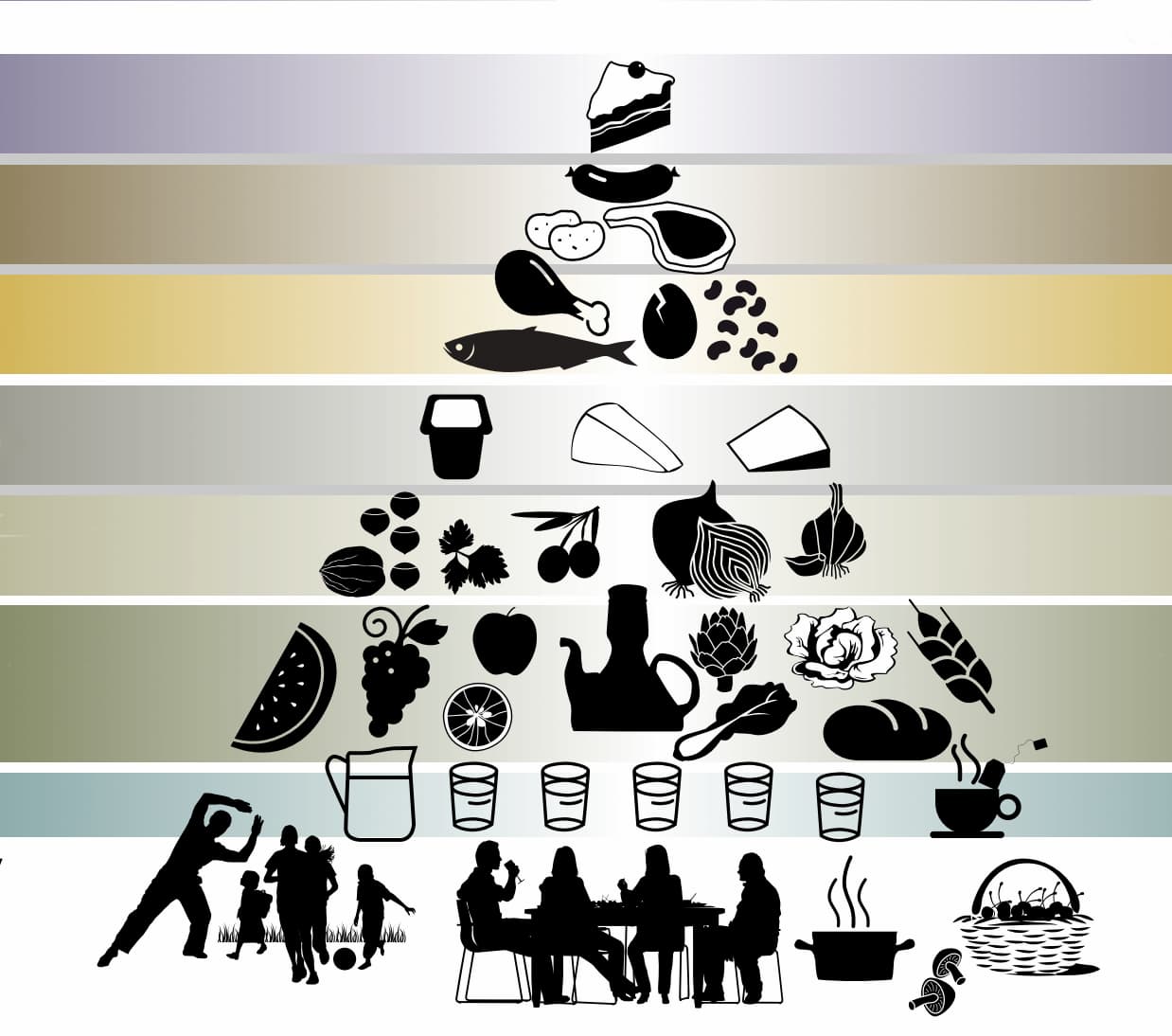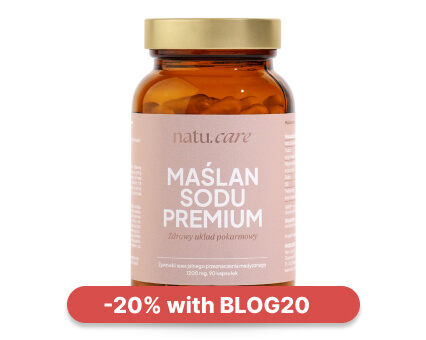Mediterranean diet: recipes, rules, prohibited products
Learn about the principles of the Mediterranean diet - a way of eating considered to be the healthiest in the world.


Learn more about our editorial process
.

Learn more about our editorial process
.

Learn more about our editorial process
.

Learn more about our editorial process
.
Why you can trust us
Articles on Natu.Care are written based on scientific research, data from government websites and other reliable sources. The texts are written in cooperation with doctors, nutritionists and other health and beauty experts. Articles are reviewed before publication and during significant updates.
.Learn more about our editorial process
.Information about advertisements
Content on Natu.Care may contain links to products from the sale of which we may receive a commission. When creating content, we adhere to high editorial standards and take care to be objective about the products discussed. The presence of affiliate links is not dictated by our partners, and we select the products we review ourselves completely independently.
.Learn more about our terms and Conditions
.How we eat is one of the main factors influencing the risk of cardiovascular disease, cancer, diabetes and even neurodegenerative conditions.
So-called diseases of civilisation are the scourge of our time - they occupy the infamous podium when it comes to causes of death worldwide. However, each of us has the power to surrender to them without a fight. One of the most effective weapons you can use against them is the Mediterranean diet.
From this article you will learn:
- Whether the Mediterranean diet lowers cholesterol. .
- How it affects the most serious diseases of civilisation.
- How it affects the most serious diseases of civilisation.
- What are its principles: what to eat and what to avoid. .
- How to prepare delicious and healthy Mediterranean dishes. .
- Does this way of eating have any disadvantages. .

Sprawdź, za co pokochały go tysiące klientek Natu.Care Premium Omega-3ᵀᴳ -15% z kodem BLOG15
Natu.Care Omega-3ᵀᴳ Premium
Natu.Care Omega-3ᵀᴳ Premium dla zdrowia serca, mózgu i odporności. Najlepsza przyswajalność. Optymalna dawka 750 mg. Przebadana przez niezależne laboratorium.
Zobacz więcej
Produkt ma super skład, transparentną etykietę i co dla mnie jest ważne – małe kapsułki do połknięcia. Nie ma też nieprzyjemnego efektu odbijania rybą, który miałam spożywając inne produkty. Widzę znaczną poprawę odporności. Polecam!@Kasia P.
See also:
- Diet in diabetes
- Digestible diet
- Ketogenic diet
- DASH diet
- SIRT diet
- Dabrowski's Diet
- Healthy breakfast recipes
Mediterranean diet - a diet for cholesterol?
.
Cardiovascular disease is now the leading cause of death worldwideand. Not surprisingly, a solution is now being sought to change this sorry statistic. Amidst the news of ever-new ways to magically lower the risk of heart attacks, atherosclerosis and other cardiac ailments, the Mediterranean diet is increasingly mentioned.
Did you know that...
.According to data from the Central Statistical Office in 2021, cardiovascular diseases were the most common cause of death in Poland. They account for more than 35% of all deaths among men and womenand.
The Mediterranean diet is a traditional way of eating (actually not just eating, but more on that in a moment) originating in Mediterranean countries. It is most often spoken of in the context of cuisine Greek and Southern Italian. Its roots can be traced back to ancient times and include the eating habits of Mesopotamia, Canaan and even Northern Egyptand.
In these regions, menus were based on grains, seeds, vegetables and fruits, and the main source of fats in the diet was olive oil. Protein, meanwhile, was mainly obtained from fish, seafood and legumesand.
This diet provided large amounts of unsaturated fatty acids (including omega-3 acids), fibre, vitamins and minerals. It therefore necessarily favoured low cholesteroland.
Diet is not just about food
.The word 'diet' is derived from the Greek diaita, which does not just mean foods and dishes. Diaita also referred to a whole lifestyleand. In this vein, it is recognised that physical activity, adequate sleep and rest, or hydration are as important as adequate nutrition.
The link between a Mediterranean-specific diet and a reduced risk of cardiovascular disease was first noted by American scientist Ancel Keysand. Thanks to him, the whole world took notice of this way of eating, and it is now recognised as the world's healthiest .
The queen of diets
.The Mediterranean diet has continuously won the title of World's Healthiest Diet since 2017 .
.Researchers have been studying the Mediterranean diet and its effects on our health for more than 80-90 years!.

Marta Kaczorekclinical nutritionist and personal trainer
.
Mediterranean diet and other diseases
.
The Mediterranean diet is based on products high in antioxidants and ingredients with anti-inflammatory effects. This combination counteracts chronic inflammation in the body, and also reduces oxidative stress. In this way, it prevents errors in DNA and therefore excessive damage to body cellsand.
This diet has a positive impact on overall life expectancy and has been linked to a reduced risk of cancer, diabetes and even neurodegenerative diseases .
.
A 2019 review of studies has raised that strict adherence to the Mediterranean diet is associated with reduced cancer riskand:
.
- breast - by 6%, .
- colon - by up to 45%, .
- stomach - by up to 43%, .
- bladder - up to 34%, .
- cervix - by 60%,
- nosopharynx - by 17%, .
- lungs - by 62% (and that's in smokers!).
A diet rich in healthy fats also shows a protective effect on the nervous system and brain. This means that it may be one of the factors that reduce the likelihood of dementia and Alzheimer's disease.
A meta-analysis of 2014 studies found that strict adherence to the Mediterranean diet was associated with 33% reduction in the risk of neurodegenerative diseasesand.
A meta-analysis of 10 studies involving 136,846 participants showed that the Mediterranean diet has a beneficial effect on reducing the risk of type 2 diabetes. Adherence to this diet was associated with a decrease in the incidence of the disease by up to 23%and.
Blue zones
.Blue zones are areas of the world whose inhabitants live significantly longer than the general population. There are currently 5 blue zones, and two of them are located in the Mediterranean area. Both are the islands of Greece's Ikaria and Italy's Sardiniaand.
.
Natu.Care Collagen Premium 5000 mg, mango & passion fruit

- Collagen content: 5000 mg marine collagen hydrolysate
- Additional active ingredients: vitamin C, low molecular weight hyaluronic acid (and L-theanine and coenzyme Q10 in cocoa flavoured collagen or vitamin A and vitamin E in mango–passion fruit flavoured collagen)
- Form: powder sachets
- Dose: 1 sachet per day
- Sufficient for: 30 days
Product description
Fish collagen from the Natu.Care brand in a dose of 5000 mg, based on certified ingredients of the best quality. Regular supplementation will positively influence the appearance of the skinóry, hairów and nails – they will be rebuilt and strengthened from the inside.
In addition to collagen, which is valuable for health and beauty, it also offers other active ingredients that help to maintain a youthful complexion, shiny hair and strong nails.
The formula contains a sufficient portion of the active ingredient to positively affect joints, the musculoskeletal system and immunity.
Natu.Care Premium Collagen is available in two flavours – Cacao Bloom and Rise&Shine. Both formulas are based on the following active ingredients: marine collagen hydrolysate, wild roseóbud extract and hyaluronic acid.
Additionally, Cacao Bloom contains natural L-theanine, coenzyme Q10 and defatted Dutch cacao. Rise&Shine instead contains vitamin E and vitamin A.
These are the best collagens in the world.
These best fish collagens on the market also rós taste – Cacao Bloom is a treat for chocolate lovers. Rise&Shine will appeal to those whoólike the refreshing taste of mangoófruit and passion fruit.
Pros and cons
Pros:
- Vitamin C supports the body's collagen production, enhancing its effectiveness.
- An effective dose of hyaluronic acid, which additionally supports skin hydration and joint health.
- Fish collagen absorbs 50% better. Additionally, the manufacturer specifies the fish species it is sourced from (Atlantic cod).
- The composition has been tested by the independent and accredited J.S. Hamilton laboratory.
- MSC (Marine Stewardship Council) quality certification, which confirms that the collagen source supports sustainable fishing practices.
Cons:
- None.
Additional information
Natu.Care's fish collagen receives praise for its delicious taste. You won't find the fishy aftertaste that often comes through in other collagens. Plus, you have two tasty flavors to choose from: cocoa and mango-passionfruit.
Active ingredients like coenzyme Q10, hyaluronic acid, and natural L-theanine provide anti-inflammatory and antioxidant benefits while slowing down aging processes.
User review
Super, after about 6 weeks of use, the skin on my face became noticeably firmer. Wonderful taste.
Ania ZalewskaNatu.Care customer
Natu.Care Premium collagen 10 000 mg, mango-maracuja

- Collagen content: 10,000 mg marine collagen hydrolysate
- Additional active ingredients: vitamin C, low molecular weight hyaluronic acid (and L-theanine and coenzyme Q10 in cocoa flavoured collagen or vitamin A and vitamin E in mango–passion fruit flavoured collagen)
- Form: powder sachets
- Dose: 1 sachet per day
- Sufficient for: 30 days
Product description
One of the strongest collagens on the market, whichós provides as much as 10,000 mg in a daily serving. This allows the formula to effectively support the condition of the skin, hair and nails.
With this supplement, you will support your beauty, which will allow you to visually stop the ageing process and feel a second youth!
Natu.Care Collagen Premium 10 000 mg comes in two flavours – cherry and mango-maracuja. Both formulas have the same product backbone – collagen, hyaluronic acid and vitamin C.
In the cherry version you additionally find glucosamine, chondroitin and Indian frankincense resin extract. Mango-maracuja, on the other hand, contains vitamin E and vitamin A.
Pros and cons
Pros:
- Tested collagen formula – SeaGarden, whose effects have been confirmed in clinical studies.
- Effective dose of hyaluronic acid, additionally moisturizing the skin and positively impacting joint health.
- Vitamin C supports the body’s natural collagen production.
- The composition has been tested by the independent and accredited J.S. Hamilton laboratory.
- The product has an MSC (Marine Stewardship Council) quality certification – the collagen source supports sustainable fishing practices.
Cons:
- None.
Additional information
Users praise Natu.Care Collagen Premium for the easy dissolvability of the powder.
User review
I noticed a significant improvement in my skin texture after a few weeks of taking collagen regularly. My complexion is now as soft as velvet!
Natu.Care Collagen Premium 10000 mg, cherry

- Collagen content: 10,000 mg of hydrolyzed bovine collagen
- Additional active ingredients: vitamin C, low molecular weight hyaluronic acid, glucosamine, chondroitin, extract of Indian frankincense resin (boswellia serrata)
- Form: powder sachets for drinking
- Serving: 1 sachet per day
- Lasts for: 30 days
Product description
One of the strongest collagens on the market, providing as much as 10,000 mg per daily serving. This product can effectively support the condition of joints, skin, hair, and nails.
With this supplement, you will support your skeletal and joint system as well as your beauty, helping you visually halt the aging process and feel rejuvenated!
Pros and cons
Pros:
- The daily portion of collagen is very large – as much as 10,000 mg.
- Proven collagen formula – COLLinstant, whose effectiveness has been confirmed in clinical studies.
- Effective dose of hyaluronic acid, which additionally moisturizes the skin and positively affects joint health.
- Vitamin C supports the body's natural collagen production.
- Glucosamine is a fundamental building block of compounds found in joint cartilage and a component of collagen that gives elasticity to connective tissue in tendons.
- Chondroitin is a natural component found in the human body, mainly in cartilage. This large molecule (mucopolysaccharide) has the ability to absorb water, which helps maintain the elasticity and resilience of cartilage.
- Frankincense resin extract supports blood circulation and joint mobility and reduces their stiffness. It may help alleviate inflammatory conditions.
- The composition has been tested by the independent and accredited J.S. Hamilton laboratory.
Cons:
- None.
Additional information
Users praise Natu.Care Collagen Premium for the easy dissolving of the powder.
Premium Sodium Butyrate
Product description
Premium Sodium Butyrate is a natural support for your digestive system. With a high dose of butyric acid (940 mg), it supports the regeneration of the intestinal mucosa, improving gut health and function, and aids in the absorption of nutrients. By taking care of your intestines, you're taking care of the health of your entire body.
Studies involving people suffering from irritable bowel syndrome confirm that sodium butyrate is ideal for supporting issues related to bacterial flora imbalances (for example, after antibiotic therapy), constipation and diarrhea, inflammation of the intestinal mucosa, or a diet low in fiber.
Premium Sodium Butyrate capsules are made using the innovative DRcaps® technology. This guarantees that the active ingredients in the product are protected from the destructive effects of stomach acids and digestive enzymes. As a result, we can be sure that the beneficial ingredients are released in the small intestine and are fully absorbed by our body.
Premium Sodium Butyrate from Natu Care is 100% tested, and its composition contains only the highest quality raw materials.
Pros and cons
Pros:
- Supports digestive system function
- Helpful for various gastrointestinal conditions, including IBS
- High dose of butyric acid in each capsule
- Eco-friendly, clean, and tested composition
- Free from added sugar, gluten, GMOs, and lactose
- Innovative capsule technology - DRcaps
Cons:
- None
Additional Information
Take 3 capsules daily at any time of the day, preferably with a meal. Swallow the capsules whole with water.
Premium Sodium Butyrate is intended for adults.
The product should be used under medical supervision.
User review
I've been using the product for 2 weeks. My stomach feels lighter, and my digestion has improved. I recommend it.
Natu.Care Premium Magnesium + Vitamin B6

- Magnesium content per day: 305 mg
- Additional active ingredients: Vitamin B6 (2.1 mg)
- Form: capsules
- Serving size: 3 capsules per day
- Sufficient for: 30 days
Product description
The Premium Magnesium + Vitamin B6 dietary supplement is a comprehensive product that combines three organic forms of magnesium (citrate, malate, and diglycinate) and vitamin B6 in highly absorbable forms.
Magnesium is an essential mineral without which our bodies cannot function properly. It supports the immune, nervous, and muscular systems, maintains electrolyte balance, and is involved in cell division and the regulation of mental functions.
Research shows that magnesium supplementation is even more effective when accompanied by vitamin B6, which is included in our product. Vitamin B6 is responsible for the proper functioning of the nervous and immune systems, as well as the proper functioning of the heart.
If you want to safely get rid of feelings of fatigue, concentration problems, hair loss, muscle cramps, trembling, or irritability, reach for Premium Magnesium from Natu.Care, tested by the independent, certified laboratory J.S. Hamilton Poland.
Pros and cons
Pros
- Supports the proper functioning of the nervous and immune systems.
- Reduces feelings of fatigue and tiredness.
- Maintains proper psychological functions.
- The purity of the ingredients (free from anti-caking agents, artificial fillers, and additives such as titanium dioxide, microcrystalline cellulose, talc, magnesium stearate, and silicon dioxide) has been confirmed by laboratory tests.
- High absorption of ingredients.
- Soft capsules that are easy to swallow.
- Suitable for vegetarians and vegans.
Cons
- None.
Additional information
Take with a meal, 3 capsules per day.
The capsules should be taken with at least 250 ml of water.
If you have trouble sleeping, it is advisable to take 1 capsule in the morning and 2 capsules in the evening, no later than 4 hours before bedtime.
Avoid combining with products high in calcium (milk, yogurt, cheese), as this may negatively affect magnesium absorption.
Pregnant and breastfeeding women should consult a doctor before starting supplementation.
User review
I’m very impressed with the speed of delivery. The product itself is of high quality and absorbs well. After two weeks of supplementation, I’ve noticed a significant improvement in muscle recovery, especially during periods of intense training. I highly recommend it!
Product description
The dietary supplement contains omega-3ᵀᴳ, or omega-3 acids in the form of trójglyceridesów. Scientific studies suggest that this form of fatty acidsós up to 2 times better absorbed than the estersós present in many dietary supplements on the market. This means that you are assured of their effectiveness and of supplying yourself with valuable omega acids.
Fatty acids omega-3 are derived from wild anchovy oil. It is a rich source of healthy fats that are essential for the health of the cardiovascular, immune and nervous systems, as well as the proper function of vision, joints muscles.
Scientific research suggests that wild anchovies are a good source of healthy fats.
Scientific research also suggests that an adequate intake of omega-3 fatty acidsós protects against and supports the treatment of depression and anxiety disorders. In addition, omega-3s influence the hydration and appearance of the skinóry and support healthy sleep.
.
The formula contains a total of 750 mg of EPA+DHA acidsós, which is three times higher than the recommended minimum of 250 mg for the Polish population. Omega-3 TG Premium has studies indicating that its TOTOX is 9, which is a very good result.
Supplementation of omega-3 fatty acidsóis recommended for anyone who does not eat 1–2 portions (approximately 300 g) of oily fish per week. Children during growth, seniors, physically active people, vegans and vegetarians, as well as patients undergoing cardiovascular treatment and prevention of heart disease also have an increased need.
Pros and cons
The dietary supplement contains omega-3ᵀᴳ, or omega-3 acids in the form of trójglyceridesów. Scientific studies suggest that this form of fatty acidsós up to 2 times better absorbed than the estersós present in many dietary supplements on the market. This means that you are assured of their effectiveness and of supplying yourself with valuable omega acids.
Fatty acids omega-3 are derived from wild anchovy oil. It is a rich source of healthy fats that are essential for the health of the cardiovascular, immune and nervous systems, as well as the proper function of vision, joints muscles.
Scientific research suggests that wild anchovies are a good source of healthy fats.
Scientific research also suggests that an adequate intake of omega-3 fatty acidsós protects against and supports the treatment of depression and anxiety disorders. In addition, omega-3s influence the hydration and appearance of the skinóry and support healthy sleep.
.
The formula contains a total of 750 mg of EPA+DHA acidsós, which is three times higher than the recommended minimum of 250 mg for the Polish population. Omega-3 TG Premium has studies indicating that its TOTOX is 9, which is a very good result.
Supplementation of omega-3 fatty acidsóis recommended for anyone who does not eat 1–2 portions (approximately 300 g) of oily fish per week. Children during growth, seniors, physically active people, vegans and vegetarians, as well as patients undergoing cardiovascular treatment and prevention of heart disease also have an increased need.
Additional information
The dietary supplement contains omega-3ᵀᴳ, or omega-3 acids in the form of trójglyceridesów. Scientific studies suggest that this form of fatty acidsós up to 2 times better absorbed than the estersós present in many dietary supplements on the market. This means that you are assured of their effectiveness and of supplying yourself with valuable omega acids.
Fatty acids omega-3 are derived from wild anchovy oil. It is a rich source of healthy fats that are essential for the health of the cardiovascular, immune and nervous systems, as well as the proper function of vision, joints muscles.
Scientific research suggests that wild anchovies are a good source of healthy fats.
Scientific research also suggests that an adequate intake of omega-3 fatty acidsós protects against and supports the treatment of depression and anxiety disorders. In addition, omega-3s influence the hydration and appearance of the skinóry and support healthy sleep.
.
The formula contains a total of 750 mg of EPA+DHA acidsós, which is three times higher than the recommended minimum of 250 mg for the Polish population. Omega-3 TG Premium has studies indicating that its TOTOX is 9, which is a very good result.
Supplementation of omega-3 fatty acidsóis recommended for anyone who does not eat 1–2 portions (approximately 300 g) of oily fish per week. Children during growth, seniors, physically active people, vegans and vegetarians, as well as patients undergoing cardiovascular treatment and prevention of heart disease also have an increased need.
Expert opinion
The dietary supplement contains omega-3ᵀᴳ, or omega-3 acids in the form of trójglyceridesów. Scientific studies suggest that this form of fatty acidsós up to 2 times better absorbed than the estersós present in many dietary supplements on the market. This means that you are assured of their effectiveness and of supplying yourself with valuable omega acids.
Fatty acids omega-3 are derived from wild anchovy oil. It is a rich source of healthy fats that are essential for the health of the cardiovascular, immune and nervous systems, as well as the proper function of vision, joints muscles.
Scientific research suggests that wild anchovies are a good source of healthy fats.
Scientific research also suggests that an adequate intake of omega-3 fatty acidsós protects against and supports the treatment of depression and anxiety disorders. In addition, omega-3s influence the hydration and appearance of the skinóry and support healthy sleep.
.
The formula contains a total of 750 mg of EPA+DHA acidsós, which is three times higher than the recommended minimum of 250 mg for the Polish population. Omega-3 TG Premium has studies indicating that its TOTOX is 9, which is a very good result.
Supplementation of omega-3 fatty acidsóis recommended for anyone who does not eat 1–2 portions (approximately 300 g) of oily fish per week. Children during growth, seniors, physically active people, vegans and vegetarians, as well as patients undergoing cardiovascular treatment and prevention of heart disease also have an increased need.
Natu.Care Vitamin D 2000 UI
Product description
Vitamin D plays a crucial role in our health and well-being. It affects calcium and phosphate metabolism, which translates to healthy bones and teeth. It also helps regulate the immune system, and studies indicate its influence on the functioning of the nervous system.
Vitamin D, although called a “vitamin,” is actually a prohormone that our body produces on its own, primarily under the influence of sunlight. Unfortunately, our modern lifestyle contributes to deficiencies of this essential vitamin. Working in enclosed office buildings, using (necessary!) SPF creams, and covering the body with clothing all make it very difficult, if not impossible, to obtain adequate levels of vitamin D from sunlight. This is why appropriate, year-round supplementation is so crucial.
Vitamin D from Natu.Care is a well-tested vitamin D3 suspended in safflower oil, a plant known for its numerous health benefits. The convenient, easy-to-swallow capsule will make supplementation a part of your daily, healthy routine, improving your overall well-being.
Pros and cons
Pros:
- Ensures proper functioning of the immune system
- Supports the maintenance of healthy bones and teeth
- Maintains proper heart, kidney, and muscle function
- Tested by an independent, certified laboratory
- Convenient and easy-to-swallow capsule
- Clean composition - free from added sugar, gluten, GMOs, lactose, and without preservatives or colorants
Cons:
- None.
Additional Information
Pregnant women and breastfeeding mothers should consult a doctor before using the product. This dietary supplement is intended for a healthy adult population up to the age of 75.
Collagen Booster - Glow Stories

- Active ingredients: bamboo shoot extract, Quatrefolic®, L-Methionine, L-cysteine, vitamin E, vitamin A, niacin (vitamin B3), vitamin B6, vitamin B2 (riboflavin), biotin, zinc, copper
- .
- Form: capsules
- .
- Dose: 1 capsule per day
- .
- Sufficient for: 60 days
- .
Product description
A dietary supplement containing vitamins, minerals and plant extracts thatósupport the skinóhand, hair and nails. The product is especially distinguished by the form of folate – it is Quatrefolic, whichós absorbed very well and is natural.
In addition to valuable vitamins and minerals, such as vitamin A, E, B3, B2 and biotin, the formula contains bamboo shoot extract, whichóry further enhances your beauty.
Pros and cons
A dietary supplement containing vitamins, minerals and plant extracts thatósupport the skinóhand, hair and nails. The product is especially distinguished by the form of folate – it is Quatrefolic, whichós absorbed very well and is natural.
In addition to valuable vitamins and minerals, such as vitamin A, E, B3, B2 and biotin, the formula contains bamboo shoot extract, whichóry further enhances your beauty.
Additional information
A dietary supplement containing vitamins, minerals and plant extracts thatósupport the skinóhand, hair and nails. The product is especially distinguished by the form of folate – it is Quatrefolic, whichós absorbed very well and is natural.
In addition to valuable vitamins and minerals, such as vitamin A, E, B3, B2 and biotin, the formula contains bamboo shoot extract, whichóry further enhances your beauty.
Principles of the Mediterranean diet
.
The Mediterranean diet is largely a plant-based diet, involving the consumption of no more than 2 portions of poultry and about 2-3 portions of fish or seafood per week. We try to keep red meat to a minimum - ideally eating it 3 or 4 times a month. We do the same with sweetsand.
The basics of the Mediterranean diet are (in order of the foods you should eat most often)and:
- vegetables, .
- fruits, .
- full grain cereal products, .
- cereals, .
- olives and olive oil, .
- spices (including garlic), .
- nuts, .
- yoghurts, cheeses (mainly white, cottage cheese, feta and halloumi) and other forms of dairy, .
- fish and seafood, .
- white meat, .
Products prohibited in the Mediterranean diet
.
It is worth remembering that the Mediterranean diet is not an elimination diet - it does not involve giving up any food completely. From time to time (i.e. 1-2 times a week, you can eat practically anything - from sweets to processed meatand.
This flexible approach seems the most sensible if you're looking for a healthy way of eating that you could practise for years to come, rather than tiring on it for 2 weeks (eating just apples or raw vegetables? Take it, come on...).
.
Ok, bearing in mind that banned products do not exist on the Mediterranean diet, see what to limit on itand:
- red meat (beef, pork, kidney, venison, mutton, horse meat), .
- zoonotic fats (lard, butter, lard), .
- sweets, .
- sweetened beverages, .
- highly processed foods, .
These foods are best consumed no more than once a week, and more orthodox sources treating the principles of the Mediterranean diet limit their consumption to as often as 1-2 times a monthand.
In the Mediterranean diet, on the one hand, alcohol should be severely limited, and on the other hand, dry red wine is welcome with dinner once in a while - but it is worth mentioning here that in countries where this style of diet is king, wine is diluted with water..
 .
.
Marta Kaczorekclinical nutritionist and personal trainer
.
What can you eat on the Mediterranean diet?
.
The basis of meal composition in the Mediterranean diet is whole-grain cereal products (bread, pasta, groats and rice) as well as vegetables and fruit. These are complemented by olive oil and variations of spices. It is recognised that these products should be present in every major meal of the day. White cheese and yoghurtand should also be consumed daily.
One of the main principles of the Mediterranean diet is the thermal treatment of foods using large amounts of olive oil, such as roasting meats generously coated with it. Olive oil is also added to bread, for example. It is also used cold - as the basis for most salad dressings.
.
The rest of the food should be consumed several times a weekand:
. .
|
Product . |
How many servings per week . |
Size of one portion . |
|
Egg |
2-4 |
1 medium-sized egg |
|
Potatoes |
3 or less |
180-230 g |
|
Fish and seafood |
At least 2 |
100-150 g |
|
Plegumes |
At least 2 |
About half a cup of dry pods (before they are cooked) |
|
White meat (poultry and rabbit meat) . |
2 |
100-150 g |
|
Red meat |
1-2 |
100 g |
|
Processed meat (sausages, cold cuts, fast food, minced meat, canned food) |
Fewer than 1 portion per week . |
100 g |
Remember that the more variety you eat, the better. The Mediterranean diet, in its fundamentals, implies precisely seasonal cooking. Eat those fruits and vegetables that are currently in season:
.
- In spring bet on new vegetables: watercress, chives, cucumbers, tomatoes, radishes.
- In spring put on new vegetables.
- Summer is the time for seasonal fruits such as strawberries, cherries and raspberries. The season for asparagus, sorrel and courgettes is also beginning.
- Summer.
- Autumn is instead associated with the taste of pumpkins, apples and pears. And of course mushrooms.
- In winter it is worth betting on root vegetables such as carrots, beetroot, yams and cabbage. Homemade preserves, such as pickles, will also be indispensable, enriching your menu with valuable probiotics and large amounts of vitamin C. .
Mediterranean diet - nutrition and activity pyramid
.
Who remembers when their teacher at school presented them with the food pyramid? At the time (okay, I'll say it: in my day) its basis was all kinds of flour products (white bread, pasta, groats). But a lot has changed since then.
.
Now the foundation of the pyramid is formed by the basics of a hygienic lifestyleand:
- physical activity, .
- appropriate amount sleep, .
- rest time during the day (yes - during the day), .
- social contacts, .
If you're wondering why socialising has been included right alongside a healthy dose of sleep and exercise, I've already explained. According to research, spending time with loved ones has a positive impact on your overall health and is fundamental to looking after your mental wellbeing. Regular social contact is one of the main factors in lowering the risk of depression and anxiety disordersand.
This is how the nutritional pyramid of the Mediterranean diet looks like:
.

Mediterranean diet - recipes
.
Most of your favourite foods and dishes can easily be transformed to be compatible with the Mediterranean diet. Try swapping your wheat kaiser rolls for a wholemeal, filling baguette or your yellow cheese for halloumi - experiment, make small but meaningful changes.
Tasty dishes in accordance with the principles of the Mediterranean diet have been prepared for you by dietitian Marta Kaczorek.
Mediterranean breakfast
.
Bruschetta
.
A serving contains: 510 kcal, 22 g protein, 17 g fat, 70 g carbohydrate
Ingredients:
- whole-grain baguette 100 g (1/3 piece) .
- olive oil 10 ml (1 tbsp) .
- light mozzarella cheese 60 g (3 slices) .
- tomato 170 g (1 whole) .
- cucumber 20 g (1/5 piece) .
- salt, pepper (pinch) .
Method of preparation:
.
Cut the baguette into 3-4 slices and toast in a dry frying pan. Brush the top with olive oil (about 0.5 tbsp). Blanch the tomato, peel and dice. Mix with the finely chopped onion, season to taste and add the remaining olive oil. Place the mixture on the baguette with the mozzarella on top.
.
See also:
.
Mediterranean diet: dinner recipe
.
Dorghum in rosemary with beetroot and buckwheat
.
A serving contains: 506 kcal, 37 g protein, 13 g fat, 63 g carbohydrate
Ingredients:
- fresh cod, skinless fillets 150 g (1 and 1/2 portions) .
- buckwheat groats 50 g (1/2 bag) .
- beetroot 200 g (approx. 1 and 3/4 pieces) .
- cucumber 20 g (1/5 piece) .
- bees honey 8 g (1/3 teaspoon) .
- olive oil 10 g (1 tbsp) .
- black pepper, white salt (pinch) .
- rosemary 5 g (1 teaspoon) .
- Lemon juice 3 ml (1/3 tsp) .
Method of preparation:
.
Wash the cod fillet, place on foil, sprinkle with lemon juice, sprinkle with a pinch of salt, pepper, a large pinch of rosemary and pour over the olive oil (1/2 tsp). Wrap the fish in foil and bake for about 15 minutes in an oven preheated to 200 degrees.
.
Beetroot salad: Boil the beetroot until soft, peel and grate. Finely chop the onion. Mix the beetroot with the onion, honey, olive oil (1/2 tsp), lemon juice, salt and pepper.
>
Dinner in the Mediterranean diet
.
Sandwich with avocado paste and egg
.
A serving contains: 439 kcal, 14.5 g protein, 23 g fat, 45 g carbohydrates
Ingredients:
- whole hen's eggs 50 g (1 piece) .
- avocado 70 g (1/2 piece) .
- rye bread 70 g (2 slices) .
- Lemon juice 3 ml (1/3 tsp) .
- garlic 5 g (1 clove) .
- olive oil 5 g (1/2 tsp) .
- black pepper, salt (pinch) .
Cut a ripe avocado in half, mash 1/2 of the avocado with a fork. Leave the seed in the other half and wrap it in cling film - it will stay fresh longer. Add the lemon juice, olive oil and squeezed garlic. Set aside in the fridge. Boil a hard-boiled egg. Spread avocado paste on bread, add sliced egg. Sprinkle with pepper and salt.
.
Yellow pepper salad
.
A serving contains: 101 kcal, 1.5 g protein, 5 g fat, 12 g carbohydrate
Ingredients:
- red onion 20 g (1/5 piece) .
- cucumber 60 g (1/3 piece) .
- yellow pepper 100 g (1/2 piece) .
- cocktail tomato 80 g (4 pieces) .
- olive oil 5 g (1/2 tsp) .
- dried dill 2 g (1/3 teaspoon) .
- dried parsley 2 g (1/3 teaspoon) .
Method of preparation:
.
Wash the peppers, tomatoes and cucumber and cut into pieces as desired. Add the chopped onion. Pour over the olive oil, season to taste and mix.
Prepare.
Mediterranean-style dessert
.
Protein dessert a'la "kinder country"
.
A serving contains: 456 kcal, 39 g protein, 19 g fat, 36.5 g carbohydrate
Ingredients:
- expanded amaranth seed .
- Whey protein WPC 20 g (2/3 scoop) .
- cacao 16%, powder 5 g (1/2 tsp) .
- soy milk 20 ml (1 tbsp) .
- hazelnuts 10 g (1/3 handful) .
- bitter chocolate 70-85% cocoa 20 g (2 cubes) .
- natural yogurt Skyr 150 g (1 pack) .
- xylitol 8 g (1 teaspoon) .
Method of preparation:
.
Melt the chocolate in a water bath. Add the vegetable drink and mix. Divide the yoghurt into 2 parts - to the first add the cocoa, to the second add the protein conditioner. Mix each thoroughly and sweeten the cocoa part with xylitol. Pour 1/3 of the expanded amaranth grains into the bottom of a tall jar or glass, the dark yoghurt mixture, sprinkle with chopped hazelnuts and pour in another 1/3 of the amaranth grains. Top with the light part. Pour over the cooled chocolate and decorate with the remaining amaranth. Chill in the fridge.
.
Mediterranean diet: advantages and disadvantages
.
The list of advantages of the Mediterranean diet far outweighs its disadvantages in length. See for yourself:
.
|
Benefits of the Mediterranean diet . |
Disadvantages of the Mediterranean diet . |
|
|
Mediterranean diet: for the poor or the rich?
.
Historically, the Mediterranean diet was the diet of mostly farmers and fishermen, i.e. people who were not very wealthy. This is the reason why they consumed small amounts of red meat - it was simply the most expensive.
The Mediterranean diet was the most expensive of all.
The cheapest sources of protein were legumes and, because of the geographical location, fish and seafood. Unfortunately, things are a little different today.
Although legumes are still one of the cheaper options for a good dinner, the price of fish and seafood has skyrocketed. The same goes for dairy products - especially those of high quality. However, this doesn't mean you have to give up on the Mediterranean diet.
Here are some tips on how to save money on the Mediterranean diet:
.
- Search for promotions and consider shopping to stock up (against the rules of how not to waste food) - once frozen, fish and seafood can be stored for a long time.
- Some markets offer good quality products at very affordable prices - browse the newspapers and take advantage of this. .
- Compensate for higher fish prices by including cheaper seasonal vegetables and legumes in your menu. .
- Make preserves - the prices of your favourite fruit and vegetables are higher in winter. You can take care to stock up on frozen foods or make jams or pickles while they are still in season. .
Summary
.
- The Mediterranean diet is the traditional way of eating for the people of the Mediterranean countries, and its roots date back to antiquity.
- The Mediterranean diet is the traditional way of eating for the people of the Mediterranean basin.
- In the Mediterranean diet, most meals are based on a composition of vegetables, fruits, whole grains and olive oil.
- This way of eating is based on a combination of vegetables, fruits, whole grains and olive oil.
- This diet is also rich in dairy, eggs and fish and seafood - which should be the main sources of meat. .
- An important element of the Mediterranean diet is cooking with seasonal produce and maintaining the variety of vegetables and fruits consumed.
- The Mediterranean diet is not just about having the right meals - it's about an entire lifestyle that includes physical activity, a healthy portion of rest, frequent contact with loved ones and an adequate amount of sleep.
- The Mediterranean diet has repeatedly won rankings of the Healthiest Diets in the World and is the best researched nutrition model.
FAQ
.What lowers cholesterol?
.To lower cholesterol, use the following strategies:
.- Eat more vegetables: Choose fibre-rich foods such as fruits, vegetables, whole grains. Fibre binds cholesterol in the gut, which helps to reduce cholesterol levels.
- .
- Increase physical activity: Regular exercise, such as jogging, swimming or cycling, can help lower LDL ('bad' cholesterol) and increase HDL ('good' cholesterol).
- Adhere to a healthy lifestyle: Avoid smoking and excessive alcohol consumption.
- Control your weight: Being overweight and obese can raise cholesterol levels. Losing a few pounds can help you lower it. .
- Enjoy a diet rich in omega-3: Oily fish such as salmon, mackerel, sardines are rich in omega-3 acids (DHA + EPA), which lower cholesterol.
- Avoid saturated and trans fats: These are present in processed foods and fast food, and their consumption raises cholesterol levels.
How to reduce cholesterol.
To lower cholesterol quickly, limit your intake of saturated and trans fats, which increase LDL cholesterol. For example, instead of red meat, eat fish, which is rich in healthy omega-3 fats.
Additionally, set up an exercise plan for at least 30 minutes a day, five days a week. Exercise helps increase 'good' HDL cholesterol and lowers 'bad' LDL cholesterol. In addition, physical activity promotes a healthy body weight. Being overweight promotes higher cholesterol levels. Losing even a few kilos can have a positive impact on your results.
Limit or eliminate stimulants. Cigarette smoking lowers 'good' HDL cholesterol and increases the risk of heart disease, and alcohol can raise total cholesterol.
Smoke.
Also make sure you see your doctor regularly - you should have your cholesterol checked at least once every five years.
Remember, however, that most of the cholesterol that circulates in your body comes from 'self-production', i.e. mainly from the liver. Therefore, if you want to lower this index, take care of the health of this organ - avoid stimulants, take medicines only when necessary, eat a healthy diet (the Mediterranean diet model!), drink herbs that support its work (St. John's wort, white mulberry, dandelion).
Do not forget that the majority of the cholesterol circulating in your body comes from "its own production", i.e. mainly from the liver.
What diet for high cholesterol?
.Change your diet to a Mediterranean diet. This diet is based on foods low in saturated and trans fats and rich in fibre. It involves avoiding processed foods and fatty meats. Instead, you can eat whole grains, fruit, vegetables, fish, white meat and plant-based sources of protein (e.g. legumes).
Additionally, this diet is based on a diet low in saturated fat and rich in fibre.
Additionally, this diet includes unsaturated fats that are good for the heart, such as olive oil, avocados and nuts.
What is the Mediterranean diet about?
.The Mediterranean diet is based on eating plant-based foods such as fruit, vegetables, whole grains, nuts, seeds and legumes. Eat fish and poultry several times a week. Limit your consumption of red meat to 2-3 times a month. Choose healthy fats, such as olive oil, instead of butter. Avoid processed foods and products with added sugar.
.The Mediterranean diet is good for your health as it helps maintain a healthy heart and cardiovascular system, prevents lifestyle diseases and helps maintain a healthy body weight.
What is the Mediterranean diet?
.The Mediterranean diet is an eating style based on the traditional diet of Mediterranean countries such as Greece, Italy and Spain. It is considered one of the healthiest diets in the world. To start practising it:
- Eat plenty of fruit, vegetables, whole grain cereals, nuts and seeds. They are sources of fibre, vitamins and minerals. For example, eat fruit as a snack and add vegetables to every meal.
- Eat fruit as a snack.
- Eat fish and poultry at least twice a week. They are a source of protein and healthy fats.
- Swap butter for healthy fats such as olive oil. It is rich in monounsaturated fatty acids, which are beneficial for heart health.
- Limit your consumption of red meat to a few times a month. Red meat is high in saturated fatty acids, which can increase the risk of heart disease.
- Avoid processed foods and fast food, which are often sources of trans fats and sodium. .
- Limit alcohol consumption. The Mediterranean diet allows only small amounts of red wine.
- Limit alcohol consumption.
How much weight can you lose on the Mediterranean diet?
.On the Mediterranean diet you can lose healthy weight, i.e. lose around 0.5-1 kilograms per week. However, you may just as well not lose an ounce and even... gain weight. This is because the key to weight loss is how many kilocalories you consume in relation to your needs.
.To lose weight, a calorie deficit is necessary - even healthy food in excess is fattening.
.If you want to lose weight healthily and without the yoyo effect, it may be a good idea to consult a nutritionist. The specialist will help you eliminate unhealthy eating habits and replace them with healthy alternatives. He or she will also be able to suggest a menu with an appropriate calorie supply.
.What types of meat can be eaten on a Mediterranean diet?
.The main source of meat in the Mediterranean diet should unquestionably be fish (preferably fatty ones such as salmon) and seafood. These should be eaten at least 2-3 times a week. White meat (poultry and rabbit) can also be a regular part of your plate. Consume them twice a week.
.The Mediterranean diet also allows the occasional eating of other meats: beef, mutton, lamb, pork or game - but try to limit their consumption to a maximum of 1 portion per week.
..
Sources
.See all
.Armeli, F., Bonucci, A., Maggi, E., Pinto, A., & Businaro, R. (2021). Mediterranean Diet and Neurodegenerative Diseases: The Neglected Role of Nutrition in the Modulation of the Endocannabinoid System. Biomolecules, 11(6), Article 6. https://doi.org/10.3390/biom11060790
Avenue, 677 Huntington, Boston, & Ma 02115. (2018, January 16). Diet Review: Mediterranean Diet. The Nutrition Source. https://www.hsph.harvard.edu/nutritionsource/healthy-weight/diet-reviews/mediterranean-diet/
Buettner, D., & Skemp, S. (2016). Blue Zones: Lessons From the World's Longest Lived. American Journal of Lifestyle Medicine, 10(5), 318-321. https://doi.org/10.1177/1559827616637066
Finicelli, M., Di Salle, A., Galderisi, U., & Peluso, G. (2022). The Mediterranean Diet: An Update of the Clinical Trials. Nutrients, 14(14), Article 14. https://doi.org/10.3390/nu14142956
Gardener, H., & Caunca, M. R. (2018). Mediterranean Diet in Preventing Neurodegenerative Diseases. Current Nutrition Reports, 7(1), 10-20. https://doi.org/10.1007/s13668-018-0222-5
Guasch-Ferré, M., & Willett, W. C.. (2021). The Mediterranean diet and health: A comprehensive overview. Journal of Internal Medicine, 290(3), 549-566. https://doi.org/10.1111/joim.13333
GUS. (n.d.-a). Statistics of deaths and mortality from cardiovascular diseases. stat.gov.pl. Retrieved 31 December 2024 , from https://stat.gov.pl/obszary-tematyczne/ludnosc/ludnosc/statystyka-zgonow-i-umieralnosci-z-powodu-chorob-ukladu-krazenia,22,1.html
Koloverou, E., Esposito, K., Giugliano, D., & Panagiotakos, D. (2014). The effect of Mediterranean diet on the development of type 2 diabetes mellitus: A meta-analysis of 10 prospective studies and 136,846 participants. Metabolism - Clinical and Experimental, 63(7), 903-911. https://doi.org/10.1016/j.metabol.2014.04.010
Lăcătușu, C.-M., Grigorescu, E.-D., Floria, M., Onofriescu, A., & Mihai, B.-M. (2019a). The Mediterranean Diet: From an Environment-Driven Food Culture to an Emerging Medical Prescription. International Journal of Environmental Research and Public Health, 16(6), Article 6. https://doi.org/10.3390/ijerph16060942
Lăcătușu, C.-M., Grigorescu, E.-D., Floria, M., Onofriescu, A., & Mihai, B.-M. (2019b). The Mediterranean Diet: From an Environment-Driven Food Culture to an Emerging Medical Prescription. International Journal of Environmental Research and Public Health, 16(6), 942. https://doi.org/10.3390/ijerph16060942
Martinez-Lapiscina, E. H., Clavero, P., Toledo, E., San Julian, B., Sanchez-Tainta, A., Corella, D., Lamuela-Raventos, R. M., Martinez, J. A., & Martinez-Gonzalez, M. Á. (2013). Virgin olive oil supplementation and long-term cognition: The Predimed-Navarra randomized, trial. The Journal of Nutrition, Health & Aging, 17(6), 544-552. https://doi.org/10.1007/s12603-013-0027-6
Mentella, M. C., Scaldaferri, F., Ricci, C., Gasbarrini, A., & Miggiano, G. A. D. (2019). Cancer and Mediterranean Diet: A Review. Nutrients, 11(9), Article 9. https://doi.org/10.3390/nu11092059
Milenkovic, T., Bozhinovska, N., Macut, D., Bjekic-Macut, J., Rahelic, D., Velija Asimi, Z., & Burekovic, A. (2021). Mediterranean Diet and Type 2 Diabetes Mellitus: A Perpetual Inspiration for the Scientific World. A Review. Nutrients, 13(4), Article 4. https://doi.org/10.3390/nu13041307
Namara, K. M., Alzubaidi, H., & Jackson, J. K. (2019). <p>Cardiovascular disease as a leading cause of death: How are pharmacists getting involved?</p>. Integrated Pharmacy Research and Practice, 8, 1-11. https://doi.org/10.2147/IPRP.S133088
Mediterranean diet ranked best diet of 2023: Is it right for you? (2023, Jan 6). https://www.medicalnewstoday.com/articles/best-diet-2023-us-news-ranking-mediterranean-dash
Weziak-Bialowolska, D., Bialowolski, P., Lee, M. T., Chen, Y., VanderWeele, T. J., & McNeely, E. (2022). Prospective Associations Between Social Connectedness and Mental Health. Evidence From a Longitudinal Survey and Health Insurance Claims Data. International Journal of Public Health, 67, 1604710. https://doi.org/10.3389/ijph.2022.1604710
.
Editorials
Meet the team



An easy-to-digest diet will help you recover from gastrointestinal problems.

Dr Dabrowski's diet - hit or miss?

Learn about the principles of the DASH diet - one of the healthiest ways of eating in the world.



